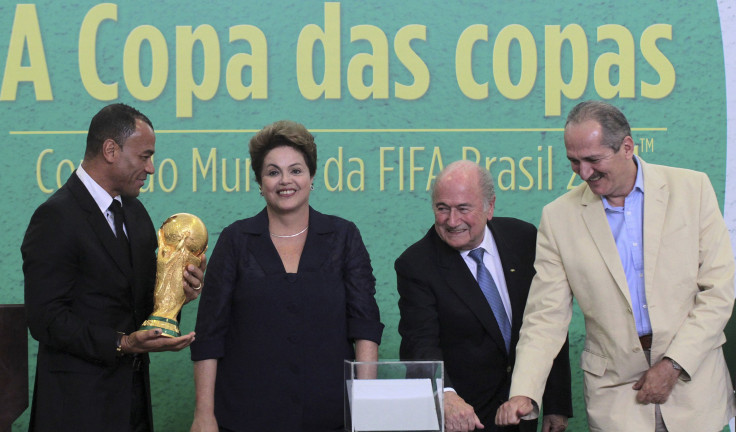Brazilian President Dilma Rousseff's Political Fate May Hang In World Cup Balance

Brazil, probably the world’s most soccer-crazed country, is hosting the World Cup for the first time in more than 60 years, and there may be more than a sports title riding on this year’s edition. The political fate of president Dilma Rousseff, who faces falling ratings in the polls and re-election in October, may hang in the balance, as a cup victory may push disgruntled Brazilians to choose the incumbent -- and a loss may do just the opposite.
“I think there are seldom events in national political life when a sporting event is as significant as this World Cup is for Brazil’s in the months ahead,” Gary Hufbauer, a senior fellow at the Peterson Institute for International Economics, said. “It will either rescue Rousseff’s flagging fortunes or just be the nail in the coffin.”
Politics also means that this year’s Brazilian team may not get the home-field support its World Cup predecessors have always enjoyed. According to a survey released earlier this month by Unicarioca, a Rio de Janeiro-based consultancy, only 55 percent of Brazilians said they will support the national team during the soccer competition. Many among the rest, fed up with the government’s economic policies, will root against the team, hoping that a loss at the World Cup will in return give them a new president.
Nearly four months before the election, approval ratings for Rousseff stand at 48 percent, down from 55 in February, a sign that her Workers’ Party could face the end of its 12 years in office. (Dilma, as she in universally known in Brazil, was preceded by eight years of Lula da Silva.) That’s a dangerously low approval rating for a president who’s already confronted a wave of street protests unprecedented in recent Brazilian history.
Violent demonstrations broke out last year after it emerged that the World Cup would require Brazil to spend more than $10 billion to build or update facilities, such as stadiums and airports, more than doubling the cost of South Africa’s 2010 World Cup. Protesters demanded that Rousseff instead use the money to help decrease the population living in poverty, which the World Bank estimates makes up about 16 percent of the country.
According to a report published by the Pew Center last week, 61 percent of Brazilians say hosting the World Cup is bad for the country because the money spent on it could be used for cash-strapped social programs.
Experts say protesting could disrupt the event, causing logistical problems and angering international investors.
“If Brazil loses or if there are problems in the logistics of the World Cup, or if there [is] repression of protesters questioning the spending … that reflects badly on the federal government,” James Green, a history professor specializing in Brazil at Brown University, said. “In that context, if things go well, it will strengthen [Rousseff’s] chances.”
Rousseff, who took office in October 2010, is up against two other candidates not widely known outside of their respective regions: Aécio Neves, a senator who heads the Party of Brazilian Social Democracy, and Eduardo Campos, leader of the Brazilian Socialist Party. Both trail Rousseff in polls, but that gap has narrowed in recent months.
Protests began in 2012 when demonstrators called for a variety of changes to the country’s social programs. Brazilians protested against increases in transportation prices initially, but later demands included an end to government corruption and police brutality.
Last year, Hufbauer told the Los Angeles Times that “the World Cup will give Brazil a black eye,” claiming that amid a declining economy, the country would not be ready to host a global event without some serious setbacks.
“I think unfortunately that looks like I was possibly right,” Hufbauer said in a phone interview.
Just one week before the start of the tournament, new protests broke out across the country. Subway workers in Sao Paulo, Brazil’s biggest city, went on strike, making it difficult for the almost 4.5 million passengers who use it daily to get to work, and thousands of homeless people marched to the Corinthians Stadium, shutting down one of the city’s main highways.
Rousseff said in a statement on June 5 that the tournament would be a success despite criticism about infrastructure delays and poor organization.
Marcos Lisboa, vice president of Sao Paulo-based Insper, a business school and economics think tank, said the government is a “hostage” of the demonstrations.
“People are just using the World Cup to go against the government,” he said. He claimed the importance of the tournament for the election is “overestimated.”
History may support Lisboa’s claim. The last three elections in Brazil were not influenced by the World Cup outcome. Brazil won the tournament in 2002, but that did not save the ruling party’s candidate. Luiz Inácio Lula da Silva won re-election in 2006 even though the team did not make it to the final, and in 2010 Rousseff won the election after Brazil was booted out of the cup in South Africa.
But despite the protests and the tensions, the country will in the end come together to support the team, according to Green. In 1970, Brazil won the championship (it has more wins than any other nation) while the country was under a dictatorship, and “even the political prisoners in jail ended up supporting the team,” he said. “Everything happens at the last second in Brazil.”
© Copyright IBTimes 2025. All rights reserved.





















